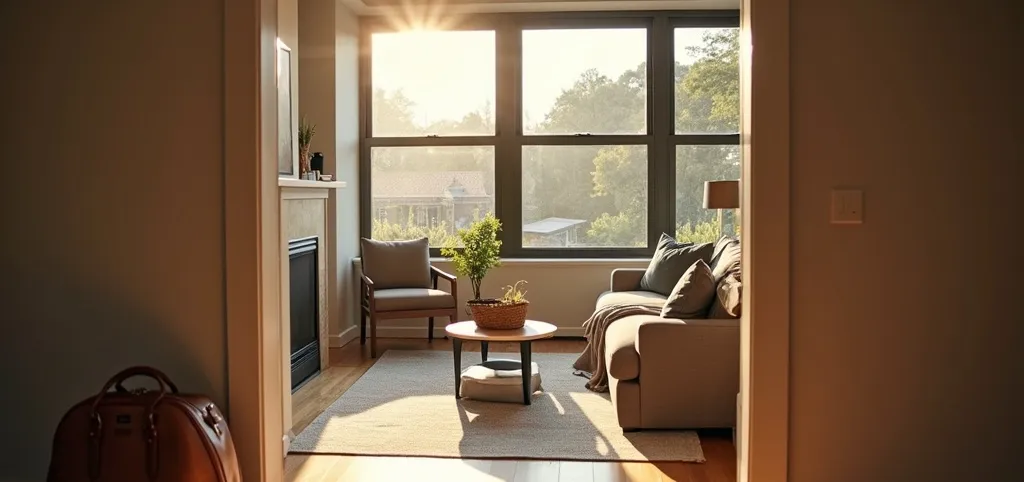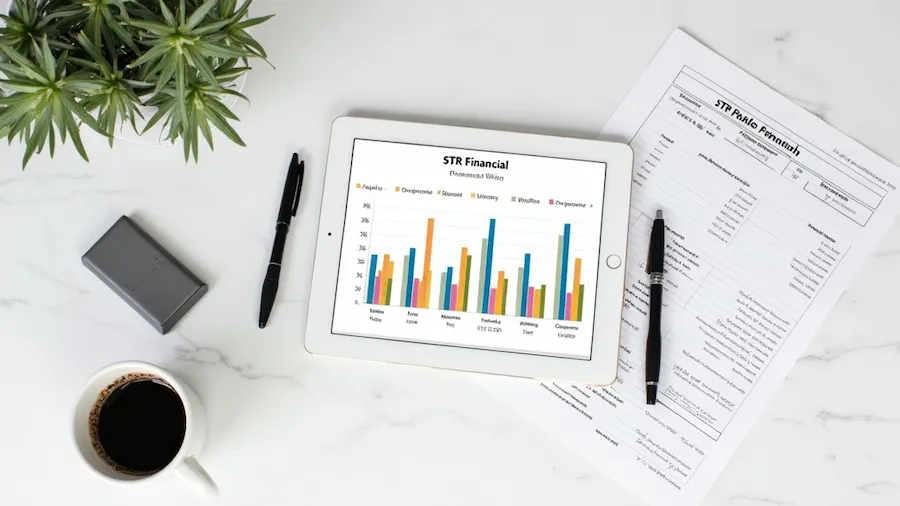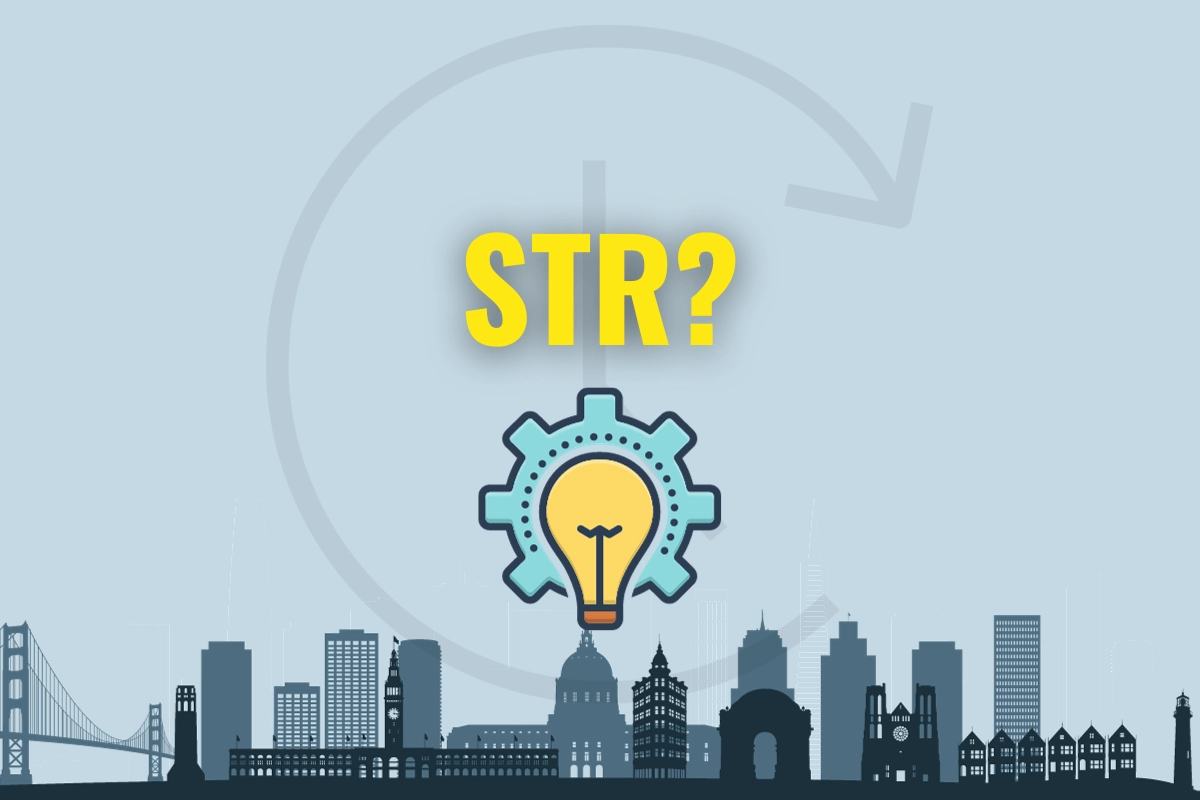Three letters show up in property listings, investor forums, and rental market conversations across the Bay Area. STR stands for Short-Term Rental, and understanding what it means could change how you think about property income, local regulations, and the difference between owning a home and running a hospitality business.
What is STR?
By definition, STR stands for Short-Term Rental. The term refers to a furnished rental property leased for a short duration, typically less than 30 days. These accommodations are most commonly used as vacation rentals, though business travelers and people relocating between homes also drive demand.
The acronym appears in real estate listings, investment analyses, and city ordinances. If someone describes a property as an “STR property,” they mean it’s being used (or is zoned for use) as a short-term rental rather than a traditional 12-month lease agreement.
Common STR Property Types
STR properties span a wide range of property types. Single-family homes in popular destinations make up the largest share, but condos, guesthouses, ADUs (accessory dwelling units), and even houseboats operate as short-term rentals in the Bay Area. The option you choose depends on your budget, your target guest, and local zoning rules that govern which properties qualify for STR permits.

STR vs. LTR vs. MTR
Real estate rental strategies fall into three categories, each with different income profiles and management demands.
An STR (Short-Term Rental) typically covers stays under 30 days. Think Airbnb, vacation homes, and weekend getaways. Revenue potential runs high, but so does the hands-on work.
LTR (Long-Term Rental) means a traditional lease, usually 12 months. Tenants pay monthly rent, handle their own utilities, and stay put. The income is predictable and the management load is light by comparison.
MTR (Medium-Term Rental) fills the gap between the two, covering stays of 30 days to six months. Travel nurses, corporate relocations, and insurance displacement housing all fall here. MTRs often avoid the strict regulations that cities impose on short-term rentals.
Comparing Returns and Flexibility
Returns vary significantly across the three models. STRs offer the highest revenue ceiling but the least predictability. LTRs provide steady returns with minimal flexibility. MTRs split the difference — the duration of each stay is long enough to reduce turnover costs while short enough to adjust pricing as market trends shift. The advantages of each model depend on your investment goals, your tolerance for hands-on management, and competition from other rentals in your area.
A rental property in Berkeley faces very different STR rules than one in an unincorporated part of Contra Costa County.
Common Misconceptions About Short-Term Rentals
- Not Long-Term: STR is not equivalent to leasing or long-term rentals. The business model, tax treatment, and regulatory requirements differ entirely.
- Legal Constraints: STRs are subject to local regulations which can vary widely. Oakland and Berkeley strictly regulate short-term rentals. If you make your property a short-term rental and the city finds out, they can elect to fine you for this violation.
- Not just Airbnb: While Airbnb dominates the conversation, STR as a category predates the platform by decades. Vacation rental homes, beach cottages, and ski cabins have operated as short-term rentals long before any app existed.
STRs vs. Hotels
Hotels and STRs compete for the same travelers, but the experience differs sharply. Hotels offer standardized service and on-site staff. STRs offer privacy, extra space, and a residential feel that hotels cannot replicate. Families traveling with children often prefer short-term rentals for the kitchen access and separate bedrooms. Business travelers increasingly choose STR accommodations for stays longer than a few nights, where a living room and dedicated workspace beat a single hotel room.
Popular STR Platforms
Platforms like Airbnb and VRBO have transformed how property owners connect with travelers seeking their next stay. These digital marketplaces create direct bridges between hosts and guests across the globe.
How Bookings and Marketing Work
Bookings follow a straightforward process. A guest searches by location and dates, filters by amenities and price, and submits a reservation request. Listings with professional photography, detailed descriptions, and strong reviews consistently outperform those without. The competition for visibility within platform search results is real — properties that maintain high response rates, few cancellations, and excellent reviews rank higher.
Marketing your STR extends beyond the platform. Successful hosts build direct booking websites and collect guest email addresses for repeat bookings. Some invest in advertising through social media to fill gaps during slower seasons.
The real advantage comes from platform-specific features. Airbnb’s Superhost program rewards reliable hosts with increased visibility, while VRBO’s Premier Partner status can differentiate your property in crowded vacation markets.
These platforms handle the complex logistics of payments, communication, and booking management, freeing owners to focus on creating the guest experiences that drive five-star reviews.

Is STR a Good Real Estate Investment?
If you’re a property owner, STRs can be a high return but high effort investment. Maintenance on short-term rentals is extensive because you have to continually maintain the property in a clean, gorgeous state to attract short-term residents.
“People hear ‘rental income’ and think passive. Running a short-term rental is closer to running a small hotel than it
is to collecting a rent check.”
Most of the websites that service this kind of rental, like Airbnb and VRBO, rate property owners as being excellent, good, or average. Hitting the excellent mark takes a lot of work. You are essentially acting as a boutique hotelier to achieve the excellent mark for these services.
Who Should Consider STR Investing
Real estate investors with hospitality experience tend to do best. The benefits of STR ownership reward people who enjoy guest interaction, problem-solving, and the daily rhythms of property management. Hands-off investors seeking passive income typically find that an LTR is a better option.
The investors who succeed treat their STR property as a real business from day one. That means tracking occupancy rates weekly, responding to guest messages within the hour, and budgeting for the inevitable appliance replacement or plumbing call that hits at the worst possible moment.
Passive income this is not. But for owners who enjoy hospitality and have the bandwidth to manage operations (or the budget to hire help), the financial upside can be significant.
Financial Considerations of STR Properties
Short-term rentals can transform your property economics, potentially generating 2-3 times the revenue of traditional leases during peak seasons. This financial upside comes with a corresponding operational commitment.
Rates, Seasonality, and Revenue
Rates fluctuate based on seasonality, local events, and day of the week. A Bay Area STR might command $350 per night during a summer weekend and $150 on a January Tuesday. The rental market shifts year to year as new listings enter the supply and travel patterns change. Data from pricing tools helps owners adjust in real time rather than guessing.
While your revenue ceiling rises dramatically, so do the operational costs. Frequent cleanings between guests, higher utility fluctuations, and more active management requirements all add up. Property management platforms typically claim 15-25% of your gross revenue.
Smart investors map these expenses against projected occupancy rates before committing.
A property that commands $250 nightly might generate $45,000 annually at 50% occupancy, but operational costs could consume $15,000-$20,000 of that total.
Financing an STR Purchase
Financing for STR properties works differently than a primary residence mortgage. Lenders typically require 15-25% down for investment properties, and interest rates run higher than owner-occupied loans. Some lenders now offer DSCR (debt service coverage ratio) loans that qualify borrowers based on the property’s projected rental income rather than personal income. This option appeals to real estate investors who already carry multiple mortgages and want to treat each asset on its own merits.
The most successful STR owners treat their properties as micro-businesses rather than passive investments, carefully tracking performance metrics through tools like PriceLabs or Beyond Pricing.
Balancing premium pricing with consistent occupancy remains the central challenge and opportunity in the short-term rental equation. Profit comes down to the spread between what you charge and what you spend to operate — and that spread narrows fast if occupancy dips below 40%.
The STR Tax Loophole
One of the most discussed financial angles of STR investing is the material participation tax strategy, sometimes called the “STR loophole.” Under IRS rules for rental real estate, short-term rental income can qualify as non-passive if the average guest stay is seven days or fewer and the owner materially participates in the rental activity.
Why does that matter? Non-passive losses from an STR property can offset W-2 or other active income on your tax return. For high-earning professionals, this can produce meaningful tax savings in the year of purchase through bonus depreciation.
Taxes on STR income extend beyond federal. Local transient occupancy taxes, state income tax, and potentially self-employment tax all apply depending on your level of involvement. This strategy is not a DIY project. Work with a CPA who specializes in real estate taxation before structuring any STR investment around tax benefits. The rules around material participation hours and documentation requirements are specific, and an audit without proper records can be costly.

California and Bay Area STR Regulations
California does not have a single statewide STR law. Instead, each city and county sets its own rules. This creates a patchwork of regulations across areas that property owners must research carefully before listing any rental property.
Compliance After SB 346
A major shift arrived on January 1, 2026, when Senate Bill 346 took effect. This law gives California cities the power to compel Airbnb, VRBO, and other platforms to share host data, including property addresses, listing URLs, and license numbers. Cities must adopt a local ordinance to activate this authority, but the tool now exists for enforcement at scale.
Compliance is no longer a gray area for STR operators. Estimates suggest 25-75% of short-term rentals in California operate without proper licenses. SB 346 targets that gap directly, and cities with active housing development concerns are moving quickly to adopt enforcement ordinances.
Berkeley STR Rules
Berkeley takes a strict approach. Short-term rentals are allowed only in your primary residence, for stays of 14 or fewer consecutive days. Investment properties and secondary homes do not qualify.
Hosts must pay a 12% Transient Occupancy Tax, a 2% enforcement fee, and a $225.50 annual application fee. You also need $1 million in liability insurance coverage and proof of ownership or landlord approval.
The city actively enforces these rules. Operating an unlicensed STR in Berkeley carries real financial consequences.
How to Get Started With an STR
Before purchasing a property or converting an existing one, work through these fundamentals.
Planning, Location, and Due Diligence
Planning starts with location. Location determines more than your nightly rate — it shapes your guest mix, occupancy patterns, and which regulations apply. Proximity to popular destinations, transit hubs, and local attractions all matter. A property near downtown Oakland draws a different guest than one in the Napa foothills, and each area carries different housing regulations.
- Research local ordinances. Check your city’s zoning code and STR permit requirements. What Berkeley allows differs sharply from what neighboring Albany or El Cerrito permits.
- Run the numbers honestly. Use conservative occupancy estimates (40-50% for a new listing) and factor in every cost: cleaning, supplies, insurance, platform fees, maintenance, and your time. Understanding your home buying power before purchasing an investment property prevents overextending.
- Choose your management model. Self-managing saves the 15-25% management fee but demands 10-20 hours per week during peak season. Third-party managers handle everything from guest communication to linen service, but your margins shrink accordingly.
- Furnish with durability in mind. STR furniture takes far more wear than a primary residence. Commercial-grade linens, stain-resistant fabrics, and simple, replaceable decor outlast trendy pieces that break after the third guest rotation.
The escrow and title process for an STR purchase works the same as any residential transaction, but your due diligence should also cover HOA restrictions on short-term renting and any pending local ordinance changes.
STR Property Management
Property management for an STR looks nothing like collecting rent on a long-term lease. The operational rhythm is closer to hotel management than traditional landlording.
Amenities, Guest Experience, and Upkeep
Each guest expects the property in spotless condition on arrival. Guest turnover drives the workload. Each checkout triggers a cleaning, a damage inspection, a linen swap, and a restock of consumables. During peak season, you might turn a property three or four times per week. Off-season, the same property might sit empty for stretches, and you still carry the mortgage, insurance, and utility costs.
Amenities separate good listings from great ones. Fast WiFi, a well-stocked kitchen, quality toiletries, and a clear house manual all improve the guest experience and lead to stronger reviews. Small upgrades like a coffee machine, blackout curtains, or a Bluetooth speaker can justify higher nightly rates. Repairs should be handled between stays — a dripping faucet or broken cabinet door noticed by a guest becomes a one-star comment.
Pricing tools like PriceLabs and Beyond Pricing use market data to adjust your nightly rate based on local demand, events, and competitor pricing. These tools earn their cost quickly. Static pricing either leaves money on the table during high-demand periods or sits vacant because you priced above the market during slow weeks.
For owners who do not want the daily grind, a property management service handles guest communication, maintenance coordination, and turnover logistics. The 15-25% fee stings, but it buys back your time and often improves review scores through professional-grade operations.
Frequently Asked Questions
Is STR the same as Airbnb?
No. STR is a category of rental property. Airbnb is one platform where STR owners list their properties. You can also list on VRBO, Booking.com, Furnished Finder, or market directly through your own website. Airbnb has become synonymous with short-term rentals in casual conversation, but the two are not interchangeable terms.
What are the risks of STR property investment?
Regulatory changes top the list. Cities can (and do) pass new ordinances restricting or banning short-term rentals, sometimes with little notice. Beyond regulation, STR owners face seasonal income fluctuation, higher property wear, guest damage, and the constant operational demands of turnover. A property generating $45,000 annually can drop to half that if a competing hotel opens nearby or if local tourism shifts.
How is STR income taxed?
STR income is generally reported as rental income on Schedule E. However, if the average guest stay is seven days or fewer and you materially participate in the activity, the IRS may classify it as non-passive. Local transient occupancy taxes (TOT) also apply in most California cities. Consult a tax professional familiar with real estate before filing.
What happens if I operate an STR without a permit?
Fines vary by city but can be substantial. Berkeley and Oakland actively enforce their ordinances. With SB 346 now giving cities the power to pull listing data directly from platforms, unlicensed operators face increasing detection risk. The cost of a fine almost always exceeds the cost of proper permitting.
Can I run an STR in a property with an HOA?
It depends entirely on your HOA’s CC&Rs (Covenants, Conditions, and Restrictions). Many HOAs prohibit or limit short-term rentals. Review your governing documents and check with your HOA board before investing in a property with the intention of operating it as an STR. The close of escrow is the wrong time to discover your HOA bans rentals under 30 days.

